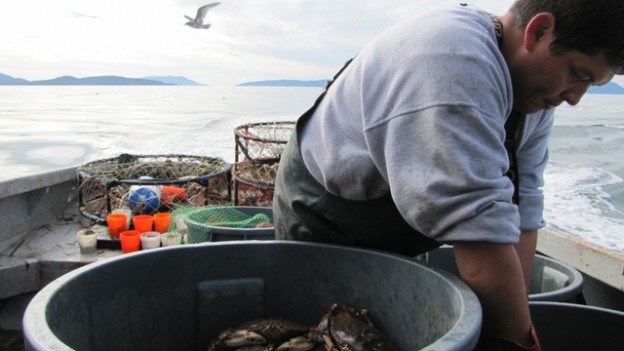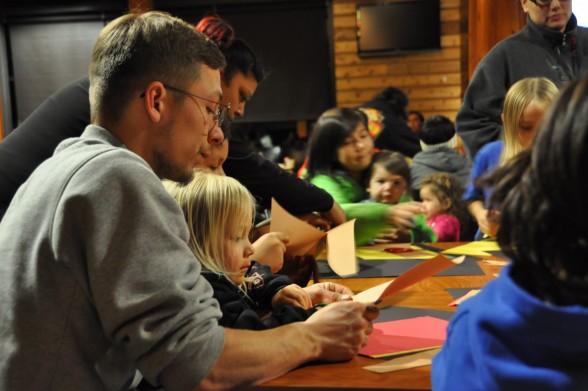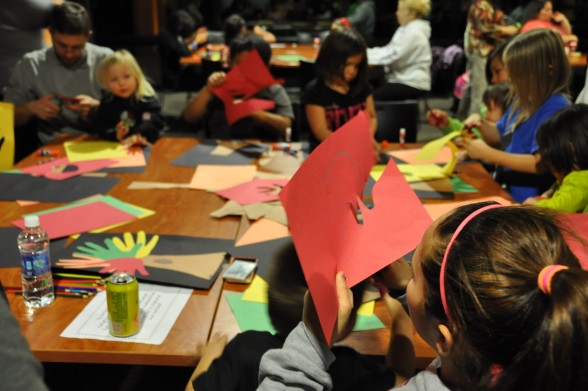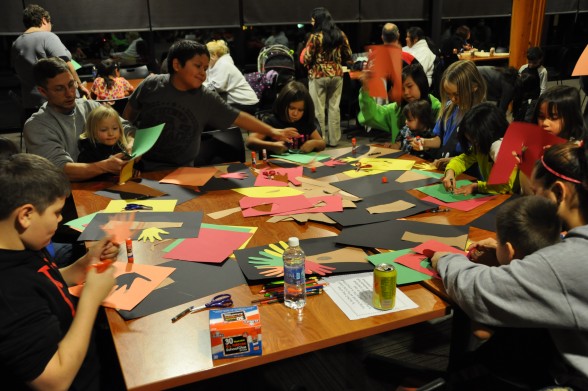Tag: Tulalip
Tribal Fishery Opposes Washington Coal Terminal

December 11, 2013 Here&Now
About a quarter of all the coal the U.S. exports goes to Asian markets. To meet the demand, there are plans to build what would be the largest coal terminal in North America at a place called Cherry Point in the far northwestern corner of Washington state.
But there’s a hitch. The waters surrounding Cherry Point support a fishing industry worth millions of dollars. It’s also a sacred place for the Lummi tribe, whose reservation is nearby. And thanks to a landmark legal decision in the 1970s, tribes have the right to weigh in on — and even stop — projects that could affect their fishing grounds.
From the Here & Now Contributors Network, Ashley Ahearn of KUOW reports.
Reporter
Ashley Ahearn, environment reporter for KUOW and part of the regional multimedia collaborative project EarthFix.
Follow link to listen to Transcript
JEREMY HOBSON, HOST:
It’s HERE AND NOW.
Coal prices are at the highest levels in months thanks to strong demand from Asian markets like China. And to help meet that demand, there are plans to build a huge new coal terminal in Washington State, at a place called Cherry Point. But the waters surrounding Cherry Point support a fishing industry that’s worth millions of dollars, and it’s a sacred place for the Lummi tribe, which has the right to weigh in on or put a stop to projects that could affect their fishing grounds.
From the HERE AND NOW Contributors Network, KUOW’s Ashley Ahearn reports.
ASHLEY AHEARN, BYLINE: Jay Julius and his crew pull crab pots up out of the deep blue waters near Cherry Point. From massive buckets on deck comes the clack and rustle of delicious Dungeness crabs in futile attempts at escape. We’re about 15 miles south of the Canadian border.
JAY JULIUS COUNCILMEMBER, LUMMI TRIBAL COUNCIL: That’s not bad.
AHEARN: Jay Julius is a member of the Lummi tribal council. His ancestors have fished these waters, just like he does now, for thousands of years. One out of every 10 Lummi tribal members has a fishing license, and the Lummi tribal fishery is worth $15 million annually.
COUNCIL: So now we’re entering the proposed area for the coal port. As you can see, the buoys start.
AHEARN: Dozens upon dozens of crab pots buoys dot the waters around us, like a brightly colored obstacle course as we approach Cherry Point.
COUNCIL: We see buoys up there.
AHEARN: If the Gateway Pacific Terminal is built, it could draw more than 450 ships per year to take the coal to Asia. Those ships would travel through this area of Cherry Point. The tribe is worried that its shellfish, salmon and halibut fishery will suffer.
COUNCIL: What does that mean to our treaty right to fish? This will be no more.
AHEARN: That treaty right to fish could play a major role in the review process for the Gateway Pacific Terminal and the two other coal terminals under consideration in the Northwest. In the mid-1800s, tribes in this region signed treaties with the federal government, seeding millions of acres of their land. But the tribal leaders of the time did a very smart thing, says Tim Brewer. He’s a lawyer with the Tulalip tribe.
TIM BREWER: What they insisted on was reserving the right to continue to fish in their usual and accustomed fishing areas. Extremely important part of the treaty.
AHEARN: Those treaty rights weren’t enforced in Washington until a momentous court decision in 1970s known as the Boldt Decision. It forced the state to follow up on the treaty promise of fishing rights that were made to the tribes more than a century before. Brewer says the phrase, usual and accustomed fishing areas, has implications for development projects, like coal terminals.
BREWER: If a project is going to impair access to a fishing ground and that impairment is significant, that project cannot move forward without violating the treaty right.
AHEARN: And in recent decades, tribes have flexed to those treaty muscles. The Lummi stopped a fish farm that was planned for the water’s off of Lummi island in the mid-’90s. The tribe argued that constructing the floating net pens would block tribal access to their usual and accustomed fishing grounds.
BREWER: And in that case, the Corps of Engineers denied that permit on that basis. There was no agreement that was bled to be worked out there.
AHEARN: But in other situations, agreements had been made.
DWIGHT JONES: My name is Dwight Jones. We’re at L.A. Bay Marina.
AHEARN: Jones is the general manager of the marina. Behind where he’s standing, Seattle’s Space Needle pierces the downtown skyline in the distance.
JONES: L.A. Bay Marina is the largest privately owned and operated marina on the West Coast. We have about 1,250 slips.
AHEARN: The marina was built in 1991 after a decade of environmental review and haggling with the Muckleshoot tribe. The marina is within the tribe’s treaty fishing area.
JONES: It was contentious, I guess, would be the right word.
AHEARN: Could they have stopped this project from being built?
JONES: Oh, absolutely. Absolutely they could’ve stopped it.
AHEARN: But they didn’t. Instead, the tribe negotiated a settlement. The owners of L.A. Bay Marina paid the Muckleshoot more than a million dollars upfront. And for the next hundred years, they will give the tribe eight percent of their gross annual revenue.
JONES: Anybody in business can tell you that eight percent of your gross revenue is a huge number. It really affects your viability as a business, so…
AHEARN: What would you say to companies that are trying to build a coal terminal?
(LAUGHTER)
JONES: I’d say good luck. It’s a long road, and there will be a lot of cost and the chances are, the tribes will make it – will probably negotiate a settlement that works well for them and will be – not be cheap.
AHEARN: SSA Marine and Pacific International Terminals, the companies that want to build the terminal at Cherry Point, have lawyers and staff members trying to negotiate a deal with the Lummi. But Jay Julias, a Lummi councilmember, laughs when I asked him how he feels about the company’s efforts to make inroads with the tribe.
COUNCIL: I say they’re funny, but I think they’re quite disgusting. The way they’re trying to infiltrate our nation, contaminate it, use people – it’s nothing new.
AHEARN: SSA Marine declined repeated requests to be interviewed for this story. But they emailed a statement. It says: We sincerely respect the Lummi way of life and the importance of fishing to the tribe. We continue to believe we can come to an understanding with the Lummi nation regarding the Gateway Pacific Terminal project. For HERE AND NOW, I’m Ashley Ahearn in Seattle. Transcript provided by NPR, Copyright NPR.
Everett’s Robinson likely to become newest member of state House
By Jerry Cornfield, The Herald, December 12, 2013
Democrats are hoping the die is cast for June Robinson, of Everett, to become a member of the state House of Representatives next week.
Robinson emerged Tuesday night as the party’s top choice to fill the 38th Legislative District seat John McCoy vacated when he moved to the Senate.
She finished ahead of Jennifer Smolen of Marysville and Deborah Parker of Tulalip in balloting by the district’s precinct committee officers.
On Monday, the Snohomish County Council will interview the three nominees, then appoint one to represent residents in Everett, Tulalip and a slice of Marysville through the 2014 election.
The four Democrats and one Republican on the County Council are expected to respect the wishes of the party members and Robinson could be sworn in Monday afternoon.
Robinson’s resume of community service is impressive and she’s got a track record of involvement in the Democratic Party. And she racked up endorsements for the appointment from lawmakers like McCoy and Rep. Hans Dunshee, D-Snohomish, as well as former Sen. Nick Harper.
Yet the next few days could be interesting, should Smolen, Parker or both be of the mind to try and persuade County Council members to buck the party activists.
Parker entered the competition at the quiet urging of U.S. Sens. Patty Murray and Maria Cantwell. Those are good friends to have if they’ll make a phone call on your behalf.
And Smolen did work alongside council Chairwoman Stephanie Wright last year and state Sen. Steve Hobbs, D-Lake Stevens, the year before that. She knows how politics is played in Snohomish County and Olympia.
Though each can make a case for themselves to the council these next few days, they’ll probably need to wait to make it for voters next year if they really want the job.
All signs point to the die being cast for Robinson becoming the newest member of the Legislature.
A little ways south, a race is starting to take shape for a seat in the 21st Legislative District.
State Sen. Paull Shin, D-Edmonds, intends to retire when his term ends in 2014 and Rep. Marko Liias, D-Everett, is campaigning with a full head of steam to replace him.
That means Liias’ seat will be opening up in the district which encompasses Edmonds, Lynnwood and south Everett. Like the 38th, it has a history of electing Democrats.
Lillian Ortiz-Self, of Mukilteo, is a Democrat who has wasted little time in pursuing it. She launched her campaign in late October and hauled in a little more than $5,000 in contributions in the first few hours.
This is her first bid for state office but the Everett High School counselor is no political novice.
She is in her second term on Washington’s Commission on Hispanic Affairs and serves on separate committees dealing with the issues of discipline, academic achievement and educational opportunities in the public schools system.
On the Republican side, Jeff Thorp said he is gearing up to run.
Thorp, who was just elected to a third term on the Mukilteo School Board, would be making his second bid for state office. He lost to Mike Cooper in 2002 and contemplated a run against former Rep. Brian Sullivan in 2004 then decided against it.
With the prospect of an open seat, more candidates are expected to step up before the filing deadline next May.
Party to narrow search for 38th District vacancy
By Jerry Cornfield, The Herald, December 10, 2013
EVERETT — Democrats in the 38th Legislative District are expected tonight to decide three candidates to fill former Rep. John McCoy’s seat now that he’s serving in the Senate.
Seven people are vying for the post and the Democratic precinct committee officers gathering at 7 p.m. in the Everett Labor Temple will nominate three of them for the job.
The Snohomish County Council will interview those nominees and make the appointment next Monday afternoon.
The appointee will represent the district, which includes Everett, Tulalip and part of Marysville. To keep the $42,106-a-year job, the person will need to win a full two-year term in next fall’s election.
June Robinson, Jennifer Smolen, Deborah Parker, Ed Triezenberg, Kelly Wright, Ray Miller and David Simpson are the candidates.
Robinson, of Everett, is a program manager with Public Health Seattle & King County and secretary of the legislative district. She ran unsuccessfully for Everett City Council in 2011 and 2012.
Smolen, of Marysville, worked as an aide to state Sen. Steve Hobbs, D-Lake Stevens, in 2011 and Democratic Snohomish County Councilwoman Stephanie Wright in parts of 2011 and 2012. She also served a stint on the state committee of the Democratic Party.
Parker, of Tulalip, was elected vice chairwoman of the Tulalip Tribes in 2012 and recently testified to congressional committees on the Violence Against Women Act.
Triezenberg, of Tulalip, is a longtime official in organized labor. He’s a former lobbyist for the Pacific Northwest Regional Council of Carpenters and presently works for the Carpenters Union. He has said he will run for the seat regardless of the outcome of the appointment process.
Wright, of Marysville, is a former state House aide and current state committee representative from the district. He has said if selected he will only serve for the 2014 session and not run next year in order to let voters pick the person they want for the full term.
Miller, of Marysville, is a certified veterans services officer, and founder of the nonprofit veteran assistance group, Vets Place Northwest-Welcome Home. He also is vice-chairman of the 38th Legislative District Democrats as well as chairman of its membership and endorsement committees.
Simpson, of Everett, served on the Everett City Council from 1998 through 2001 and as an appointed state legislator in 2004. He represents the district Democrats on the executive board of the county Democratic Party.
McCoy was appointed to the Senate last month to replace Nick Harper who resigned.
The debate: Indian names, mascots for sports teams

By Rich Myhre, The Herald
As a former student at Marysville-Pilchuck High School, home of the Tomahawks, Dr. Stephanie Fryberg remembers seeing a fellow student clad in a headdress of feathers and watching as other kids participated in the Tomahawk Chop.
Fryberg, a Native American and member of the Tulalip Tribe, said she always found those displays disturbing.
“I was an athlete in Marysville and I was definitely part of the sports culture, but I always felt weird about that,” said Fryberg, who received a PhD from Stanford University in 2003 and is today an assistant professor in the Department of Psychology at the University of Arizona, where she is also affiliate faculty for American Indian Studies (she is on leave in the current academic year).
“If you’d go and watch (those displays at Marysville-Pilchuck events),” Fryberg added, “you’d never see Native students participating.”
The use of Native American sports nicknames and mascots has been a controversial topic for many years, and one recently rekindled when President Barack Obama said he would “think about changing” the name of Washington’s NFL team, the Redskins, if he owned the ballclub.
“I don’t know whether our attachment to a particular name should override the real legitimate concerns that people have about these things,” Obama added in an interview with The Associated Press.
Fryberg agrees, and said she backs her position with research that proves those nicknames and mascots have a negative effect on the self-perception of Native American students. “I’m a scientist,” she said, “and from that level, absolutely, the data is concrete.”
Team names like Indians, Chiefs and Braves, among others, are “a stereotype that’s playing with someone’s identity,” she said.
Likewise, Fryberg finds the Redskins nickname particularly offensive “because it very much has race connotations, though that’s not my area of (research) expertise,” she said.
This issue has always been particularly relevant at Marysville-Pilchuck High School, which serves the Tulalip reservation. There have been periodic discussions over the years about dropping the Tomahawks nickname, and one of the most intense debates occurred in the 1980s when Marysville High School and Pilchuck High School merged to form Marysville-Pilchuck.
Some in the community urged the school board to use Pilchuck’s nickname, the Chargers, for the newly merged school. But among those arguing otherwise was Don Hatch, a member of the Tulalip Tribal Council and a man who later served 16 years on the Marysville School District board.
Hatch says that Native American nicknames and mascots “are not derogatory,” and he believes it so strongly that he purchased Redskins sweatshirts, hats and other team merchandise when he visited Washington while representing the Tulalip Tribal Council.
“I’m proud of the Redskins,” he said. “I support them, just like I do the Tomahawks. … I think it brings to light us as Indian people.”
Years ago, Seattle’s Blanchet High School considered changing its nickname from Braves. Hatch said he visited the high school and spoke to the students at an assembly, urging them to retain the nickname. His words evidently had an impact as Blanchet teams are still called the Braves.
Likewise, Marysville-Pilchuck remains the Tomahawks and that nickname is a tribute to the Tulalip history, culture “and pride we have,” Hatch said. Likewise, the school colors remain red and white, which is emblematic “of the red man and the white man,” he said.
Tulalip Tribes Chairman Mel Sheldon could not be reached for comment, but in a statement released by a tribal representative he said: “It’s time for sports teams to change mascot designations that use Native American names and cultural imagery. Stereotypes, no matter how innocent they seem, help to perpetuate certain perceptions about Native Americans that obscure our history, and the contributions we’ve made to American society.
According to Fryberg, those nicknames and mascots also demean the people they are purported to esteem. “People say they are honoring Natives,” she said. “No, they’re not.
“Given the difficulties Native students have had being successful in mainstream schools,” she went on, “I just don’t think it’s a place where we need to add one more stereotype and one more barrier for Native students to (overcome). … Negative stereotypes are playing with people’s identity, and at the end of the day, how many Native students have to say it bothers them before we care?”
The striking thing about this issue, of course, is how vigorously people disagree, including many Native Americans themselves. While some see nicknames like Indians, Chiefs, Braves and even Redskins as symbols of disrespect, others like Hatch believe those same nicknames help to preserve the historical dignity, pride and heritage of all Native Americans.
Keeping those nicknames “is very important,” he said. “And I’m proud to have (sports teams) named after our Indian people.”
GOP has slim, but possible, chance to win House seat
December 5, 2013
By Jerry Cornfield, Herald Writer
It’s been 33 years since voters chose a Republican governor in Washington.
But it’s been even longer since a member of the Grand Old Party got elected from the 38th Legislative District to the House of Representatives.
You have to go back half a century to find the last one — Jack Metcalf, a Whidbey Island Republican who won a House seat when the district’s boundaries encompassed parts of Snohomish and Island counties.
With any luck, Republicans could end their losing streak next year in a district now centered in Everett and includes Tulalip and a sliver of Marysville.
A vacancy in the state House is creating the potential opportunity. Democrat John McCoy of Tulalip moved from the House to the Senate last month and seven people want his old seat.
June Robinson, Jennifer Smolen, Deborah Parker, Ed Triezenberg, Kelly Wright, David Simpson and Ray Miller are hustling up support from Democratic precinct committee officers who will vote out their top three choices Tuesday. Sometime in the following week, the Snohomish County Council will appoint one of them.
All seven are respectable members of the community with solid Democratic credentials and similar philosophical approaches to governing.
None of them are political rock stars and most are not widely known among voters. Whoever is appointed will need to squeeze out every ounce of advantage from their incumbent status to retain the job in next fall’s election.
As a newcomer, they’ll be politically vulnerable. Any vote they take, bill they introduce, utterance they make could find its way into the campaign. As a latecomer, they will be unable to fund raise during the 2014 session, while any Republican challenger can.
Those are small factors in Republicans’ favor. And they may not be the only ones.
Voters in the district may be less enamored with embracing all Democrats for office after seeing two of them, County Executive Aaron Reardon and state Sen. Nick Harper, resign in disgrace this year.
And if Republicans field a candidate with a strong resume and ample campaign billfold — something they’ve not done in recent years — victory isn’t beyond grasp.
Much of it will depend on what happens in Everett, where the largest chunk of the district’s voters resides.
While Everett voters only seem to send Democrats to do their bidding in Olympia, they are not afraid of electing Republicans to the nonpartisan City Council.
Scott Bader proved it last November when he defeated June Robinson for a council seat by roughly 1,800 votes. Though there was no “R” next to Bader’s name or “D” next to Robinson’s; one didn’t have to work very hard to find out what political party each associated with.
It was an impressive performance in a presidential election year. Democrats turned out more voters than Republicans and outspent them to make sure everyone knew the names of all the Democrats on the ballot.
Still, in numerous Everett precincts, Bader received as many votes as McCoy did in his legislative race.
Campaign strategists view such ballot behavior as an opportunity to snare votes from the less partisan members of their opponent’s party.
Republican Party leaders may see this as one more selling point to those they’re recruiting to do battle for the seat in 2014.They’ll need a few as they know history is not on their side.
Political reporter Jerry Cornfield’s blog, The Petri Dish, is at www.heraldnet.com. Contact him at 360-352-8623 or jcornfield@heraldnet.com.
Six vie for state House seat vacated by McCoy
Democratic precinct officers will select three names Dec. 10 to forward to the county council.
By Jerry Cornfield, Herald writer
EVERETT — A small crowd of Democrats is lining up for a chance to fill John McCoy’s seat in the state House, with a decision anticipated next week.
Six people are reportedly seeking the job which opened up following McCoy’s Nov. 27 appointment to the state Senate. He’s taking former state Sen. Nick Harper’s place.
June Robinson, Jennifer Smolen, Ed Triezenberg, Kelly Wright, David Simpson and Ray Miller are working to corral support from Democratic precinct committee officers, who will meet Dec. 10 to vote on their top three choices for the post. That meeting is scheduled for 7 p.m. in the Labor Temple in Everett.
Names of those nominees will be sent to the Snohomish County Council which will select the new lawmaker, possibly the next day.
Whoever gets the gig will serve in 2014 as representative for the 38th Legislative District which includes Everett, Tulalip and part of Marysville. To keep the $42,106-a-year job, they will need to run and win a full two-year term in next fall’s election.
Robinson is an Everett resident whose career has centered on managing community health and affordable housing programs. She lost races for Everett City Council in 2011 and 2012.
This fall she had been seeking appointment to a vacant council seat when Harper resigned and set off the process now culminating in the filling of McCoy’s House seat. She ended her pursuit of the council position to try to secure the legislative job.
Smolen, of Marysville, worked as an aide to state Sen. Steve Hobbs, D-Lake Stevens, in the 2011 legislative session and then for Snohomish County Councilwoman Stephanie Wright until early last year.
She also is a veteran, having served eight years in the U.S. Army Reserve, including a combat tour in Iraq in 2004 and 2005.
Wright, of Marysville, is a former aide in the state House and one-time Marysville mayoral candidate. He made a bid for the Senate seat and finished behind McCoy and Rep. Mike Sells in balloting by precinct committee officers.
He has said he’s only interested in serving as a caretaker of the House seat for the 2014 session and would not run for a full term in 2014.
Triezenberg, of Tulalip, is a former lobbyist for the Pacific Northwest Regional Council of Carpenters and presently works for the Carpenters Union.
He told precinct committee officers in a Nov. 12 email that Republicans will target this seat next year and he possesses the “competence, experience and electability” required to keep it a Democratic seat. He said he would run for the seat in the 2014 election regardless of the outcome of the appointment process.
Simpson, of Everett, served on the Everett City Council from 1998 through 2001 and briefly as an appointed state legislator.
In 2004, he was appointed to fill a vacant House seat but then lost it that fall when Sells won the election.
Miller, of Marysville, a certified veterans services officer, and founder and president of the nonprofit veteran assistance group, Vets Place Northwest-Welcome Home. He also is vice-chairman of the 38th Legislative District Democrats.
Lushootseed Family nights

By Monica Brown, Tulalip News Writer
Lushootseed Family Nights are back for the next eight weeks and the language department is inviting anyone with the desire to learn the Lushootseed language to attend. This season’s first meeting took place at the Tulalip administration building on Wednesday, Nov 20th and was organized to gaing ideas from students for the upcoming activities and lessons.
“We call ourselves language warriors and anyone who comes to help out is a language warrior too,” said Natosha Gobin during Wednesday’s family night. Family night events have been taking place since the early 90’s and are gaining momentum as more children and adults become dedicated to learning the language.

Lessons teach basic phrases, words, songs and prayers that can be used in everyday conversations. All lessons and materials are provided at no charge and are open to anyone interested in attending. At the first two meetings, dinner is provided by the department but the following meetings will be potluck dinners. Future Family Nights will be held at Tulalip Hibulb on Wednesdays from 5:00pm to 7:00pm, regular attendance is not required.
Fall Lushootseed Family Nights Schedule
November 20, 27
December 4, 11, 18
January 8, 15, 22, 29
Tulalip Hibulb Cultural Center is located at 6410 23rd Ave NE, Tulalip, WA 98271. For more information, please contact: Natosha Gobin ngobin@tulaliptribes-.gov 360-716-4499.

Telling Tulalip’s Story

By Monica Brown, Tulalip News Writer
TULALIP, Wa – Tulalip’s Hibulb Cultural Center, on occasion, feature film screenings of films that star, are filmed by or are written by Native Americans, yet all tell one facet of the Native American life. Thursday, Oct 24th’s featured screenings were of Jeff Boice’s work with the Tulalip Tribes. Jeff Boice, a videographer/editor, has been working with the Tulalip Tribes since 1990, has also done video shootings for large media companies such as The Discovery Channel and CNN.
The evenings screening were many short segments of the Walking Tour II with Ray Moses, History Minutes and a Williams Shelton’s segment. The Walking Tour follows Tulalip tribal member Ray Moses as he tells stories about significant locations on the Tulalip reservation. “He’s quite a historian. It was great working with Ray,” commented Boice.
History Minutes are under a few minutes, are produced for the museum and focus on one particular aspect of tribal life such as boarding school life or construction of summer homes that were used in the old days.
The William Shelton segment centered on the portion of William’s life when he carved the Sklaletut pole, a culturally important piece of artwork. Boice has a genuine interest in documenting the past of the Tulalip Tribes and states, “Our hopes are that this video will help generate enough interest to be able to do a longer documentary [on William Shelton] but not just that but to generate interest in preserving the Sklaletut pole.”
Most screenings events at the Hibulb are relatively intimate, are under a few hours and include a Q and A afterwards. For more about future film screenings at the Hibulb please visit their website or call 360-716-2600. To view the works of Jeff Boice, visit Boicetv.com.








